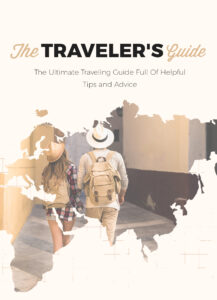How to Plan a Trip Without Feeling Overwhelmed

Looking for more amazing products? Check out our online store and explore our collection here! Happy shopping!
Before diving in, please note: This post is for informational purposes only. If you’d like to know more about how we approach topics, feel free to check out our friendly Disclaimer Page.
Hey there, amazing readers! 
We’re committed to delivering quality posts, and your support (even just sticking around despite the ads) means everything to us. So, bear with us, and thanks for helping us keep the good vibes rolling. Now, on to the fun stuff!
TRANSLATE BUTTON AT THE END OF THE ARTICLE
Planning a trip should be exciting, right?
But sometimes, it can feel like a whirlwind of to-do lists, decisions, and uncertainties.
From choosing the right destination to figuring out what to pack, the process can easily turn into a stress fest.
But don’t worry—planning a trip doesn’t have to be overwhelming!
With a little bit of preparation and the right mindset, you can transform this task into a fun and manageable adventure in itself.
Let’s dive into how to plan a trip without feeling like it’s all too much.
1. Start With a Dream, Not a To-Do List
Before diving into the details, take a moment to simply dream.
Picture yourself on the trip, imagining the experiences you want to have.
Are you wandering through ancient streets, relaxing on a sunny beach, or hiking in the mountains?
Visualizing your ideal trip helps you focus on what truly excites you, setting a clear intention for your travels.
Set Your Priorities: What are the most important things for you?
Is it comfort, adventure, culture, or maybe a balance of everything?
Knowing this helps narrow your focus and can make the planning feel more purposeful.
2. Break It Down into Small Steps
One of the main reasons people feel overwhelmed when planning a trip is the sheer number of tasks involved.
But if you break down the planning process into small, bite-sized chunks, it becomes much more manageable.
Create a Timeline: Start by setting a rough timeline of when you want to take your trip.
This will help you visualize the planning stages and prioritize tasks.
Create Checklists: Create a checklist for each phase of the planning process: choosing a destination, booking flights, finding accommodations, packing, and so on.
Tackling one list at a time can reduce the pressure.
3. Set a Realistic Budget
Money is often the elephant in the room when it comes to planning a trip.
The thought of a big, expensive vacation can easily overwhelm anyone.
But by setting a realistic budget early on, you’ll have a clearer sense of what’s achievable and what’s not.
Budgeting Basics: Factor in transportation, accommodation, meals, activities, and even emergencies.
Don’t forget to set aside a little extra for fun spontaneous adventures!
Stick to Your Budget: Once you know your budget, try to stick to it.
There are plenty of affordable destinations, activities, and accommodations that fit within most travel budgets if you look carefully.
4. Choose Your Destination Based on Your Interests
Rather than trying to research a million different destinations, start by thinking about what type of experience you want.
Do you crave a city escape, a nature-filled adventure, a cultural journey, or maybe a relaxing beach holiday?
Narrow Down Your Choices: Once you know what type of trip you’re after, pick a few destinations that align with your interests.
Limit your options to prevent decision fatigue.
Discover "The Traveler’s Guide: Your Ultimate Companion for Every Adventure
"

Consider Accessibility and Budget: Some destinations might be more cost-effective or accessible depending on where you live, so make sure to factor in both budget and ease of travel.
5. Book Essentials First, Then Fill in the Details
After you’ve got a general sense of your destination and budget, focus on booking the essentials first: flights, accommodations, and any necessary visas or travel documents.
Flights and Accommodations: Secure your flights and place to stay as early as possible to avoid last-minute stress.
When booking accommodations, choose places that fit your budget and needs—whether it’s a cozy Airbnb, a family-friendly resort, or a boutique hotel.
Transportation: If you’ll need a car or train tickets, booking early can help ensure availability and better rates.
Leave Room for Flexibility: Once the basics are locked in, you can leave the fun stuff—like tours, excursions, or meal reservations—for later.
6. Research Your Destination Without Going Down a Rabbit Hole
The internet is full of exciting things to do and see in any given location, but there’s a fine line between thorough research and information overload.
Here’s how to keep it manageable:
Pick a Few Must-Dos: Select a few bucket-list activities you’re absolutely not going to miss.
These might include visiting iconic landmarks, exploring local markets, or experiencing a unique cultural activity.
Leave Room for Spontaneity: While it’s great to have a general itinerary, don’t feel the need to schedule every single moment of your trip.
Sometimes the best experiences happen spontaneously!
Use a Trip Planning App: Apps like TripIt or Google Trips can help you organize your itinerary, store important travel documents, and keep track of bookings in one place.
7. Don’t Overpack – Less is More
Packing can feel like a huge task, but overpacking just adds to the stress.
The key is to pack light and only bring what you absolutely need.
Here’s how:
Make a Packing List: Write down everything you think you need.
Then, go through and ask yourself if each item is truly necessary.
Can you buy anything once you arrive?
Focus on Versatility: Choose clothes and accessories that can mix and match, so you can get more wear out of fewer items.
Don’t Forget Essentials: Have your passport, tickets, and any necessary documents ready ahead of time.
Make sure you have the basics: chargers, travel adapters, medications, and toiletries.
8. Take Care of the Small Things Early
Sometimes it’s the little things that sneak up on you and cause unnecessary stress.
To avoid last-minute scrambling, take care of small details well before the trip.
Set Up Travel Insurance: Travel insurance can save you from headaches if anything goes wrong.
Whether it’s a flight delay or a medical emergency, knowing you’re covered can offer peace of mind.
Notify Your Bank: Let your bank know about your travel plans, so your credit cards aren’t flagged for suspicious activity.
Pack Early: Don’t wait until the night before your flight to pack.
A few days before you leave, start gathering your things, so you’re not rushing through it all.
9. Be Flexible and Keep a Positive Attitude
No matter how well you plan, things might not always go according to the script.
Flights get delayed, the weather doesn’t cooperate, and sometimes unexpected challenges pop up.
The key is to stay flexible and maintain a positive outlook.
Embrace the Unexpected: A missed train or a rainy day might seem annoying at the moment, but it could lead to a fun detour or a new adventure you never expected.
Focus on the Bigger Picture: Remember that the trip is about the experience, not about making everything perfect.
Be kind to yourself and take things in stride.
10. Use Technology to Your Advantage
There are so many apps, tools, and websites that can make your trip planning easier.
From finding cheap flights to tracking your itinerary, technology can help reduce the stress of planning.
Flight Alerts: Set up price alerts on flight booking sites like Skyscanner or Google Flights to catch the best deals.
Maps and Navigation: Use apps like Google Maps or Citymapper to help navigate around new cities and find the best routes.
Language Tools: If you’re traveling to a country with a different language, apps like Duolingo or Google Translate can help you communicate more easily.
Conclusion
Planning a trip doesn’t have to be overwhelming.
By taking small steps, staying organized, and focusing on the essentials, you can turn trip planning into an enjoyable part of the adventure.
Remember, the most important thing is to have fun and embrace the journey.
Your trip should be a time to relax, explore, and make memories—not a source of stress.
With the right approach, you can plan the vacation of your dreams without feeling buried in the details.
Happy travels!

The Enlightenment Journey is a remarkable collection of writings authored by a distinguished group of experts in the fields of spirituality, new age, and esoteric knowledge.
This anthology features a diverse assembly of well-experienced authors who bring their profound insights and credible perspectives to the forefront.
Each contributor possesses a wealth of knowledge and wisdom, making them authorities in their respective domains.
Together, they offer readers a transformative journey into the realms of spiritual growth, self-discovery, and esoteric enlightenment.
The Enlightenment Journey is a testament to the collective expertise of these luminaries, providing readers with a rich tapestry of ideas and information to illuminate their spiritual path.
Our Diverse Expertise
While our primary focus is on spirituality and esotericism, we are equally passionate about exploring a wide range of other topics and niches 

To ensure we provide the most accurate and valuable insights, we collaborate with trusted experts in their respective domains 
Our blog originally focused on spirituality and metaphysics, but we’ve since expanded to cover a wide range of niches. Don’t worry—we continue to publish a lot of articles on spirituality! Frequently visit our blog to explore our diverse content and stay tuned for more insightful reads.
Hey there, amazing reader! 
Check out our store here and take a peek at some of our featured products below! Thanks for being awesome!










